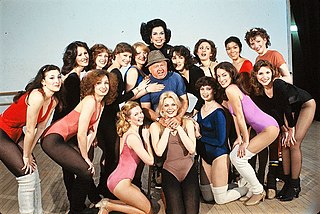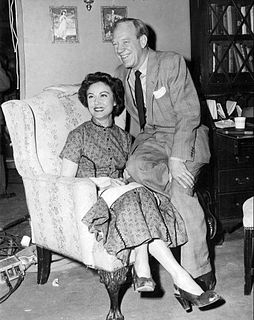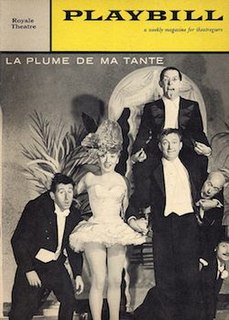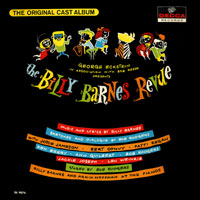Related Research Articles

Musical theatre is a form of theatrical performance that combines songs, spoken dialogue, acting and dance. The story and emotional content of a musical – humor, pathos, love, anger – are communicated through words, music, movement and technical aspects of the entertainment as an integrated whole. Although musical theatre overlaps with other theatrical forms like opera and dance, it may be distinguished by the equal importance given to the music as compared with the dialogue, movement and other elements. Since the early 20th century, musical theatre stage works have generally been called, simply, musicals.

This is a list of notable events in music that took place in the year 1950.

Lionel Bart was a British writer and composer of pop music and musicals. He wrote Tommy Steele's "Rock with the Caveman" and was the sole creator of the musical Oliver! (1960). With Oliver! and his work alongside theatre director Joan Littlewood at Theatre Royal, Stratford East, he played an instrumental role in the 1960s birth of the British musical theatre scene after an era when American musicals had dominated the West End.

Beatrice Gladys Lillie, known as Bea Lillie, was a Canadian-born British actress, singer and comedic performer.
A revue is a type of multi-act popular theatrical entertainment that combines music, dance, and sketches. The revue has its roots in 19th century popular entertainment and melodrama but grew into a substantial cultural presence of its own during its golden years from 1916 to 1932. Though most famous for their visual spectacle, revues frequently satirized contemporary figures, news or literature. Similar to the related subforms of operetta and musical theatre, the revue art form brings together music, dance and sketches to create a compelling show. In contrast to these, however, revue does not have an overarching storyline. Rather, a general theme serves as the motto for a loosely-related series of acts that alternate between solo performances and dance ensembles.

Sugar Babies is a musical revue conceived by Ralph G. Allen and Harry Rigby, with music by Jimmy McHugh, lyrics by Dorothy Fields and Al Dubin and various others. The show is a tribute to the old burlesque era. First produced in 1979 on Broadway and running nearly three years, the revue attracted warm notices and was given subsequent touring productions.

Bobby Howes was a British entertainer who was a leading musical comedy performer in London's West End theatres in the 1930s and 1940s.

Paul Hartman was an American dancer, stage performer and television actor.

As Thousands Cheer is a revue with a book by Moss Hart and music and lyrics by Irving Berlin, first performed in 1933. The revue contained satirical sketches and witty or poignant musical numbers, several of which became standards, including "Heat Wave", "Easter Parade" and "Harlem on my Mind". The sketches were loosely based on the news and the lives and affairs of the rich and famous, and other people of the day, such as Joan Crawford, John D. Rockefeller, Jr., Noël Coward, Josephine Baker, and Aimee Semple McPherson.

La Plume de Ma Tante is a 1955 musical comedy, written, devised, and directed by Robert Dhéry, with music by Gérard Calvi, and English lyrics by Ross Parker. The play consisted of a number of short sketches in English, French, and pantomime, satirizing French society.
A... My Name Is Alice is a musical revue conceived by Joan Micklin Silver and Julianne Boyd, first produced in 1983. It won the Outer Critics Circle Award for Best Revue. It consists of some 21 songs by composers such as David Zippel, Doug Katsaros, Winnie Holzman, and Lucy Simon, along with sketches by writers like Anne Meara.

Raymond Knight was an American actor, comedian and comedy writer, best known as a pioneer in satirical humor for network radio.
Alive and Kicking is a musical revue with sketches by Ray Golden, I.A.L. Diamond, Henry Morgan, Jerome Chodorov, Joseph Stein, Will Glickman, John Murray, and Michael Stewart; music by Hal Borne, Irma Jurist, Sammy Fain, Hoagy Carmichael, Harold Rome, Sonny Burke, Leo Schumer, and Ray Golden; and lyrics by Paul Francis Webster, Ray Golden, Harold J. Rome, Leonard Gershe, Sid Kuller, and Michael Stewart.
Inside U.S.A. is a musical revue by Arthur Schwartz (music) and Howard Dietz (lyrics). It was loosely based on the book Inside U.S.A. by John Gunther. Sketches were written by Arnold M. Auerbach, Moss Hart, and Arnold B. Horwitt.

Lend an Ear is a musical revue with a book, music, and lyrics by Charles Gaynor and additional sketches by Joseph Stein and Will Glickman.
Grace Adelaide Hartman was an American stage and musical theatre actress.

The Billy Barnes Revue is a 1959 musical comedy revue with music and lyrics by Billy Barnes and sketches by Bob Rodgers. The revue premiered in Los Angeles in 1959 and went on to be produced both on Broadway and Off Broadway.

Oh! Calcutta! is an avant-garde theatrical revue created by British drama critic Kenneth Tynan. The show, consisting of sketches on sex-related topics, debuted Off-Broadway in 1969 and then in the West End in 1970. It ran in London for over 3,900 performances, and in New York initially for 1,314. Revivals enjoyed even longer runs, including a Broadway revival that ran for 5,959 performances, making the show the longest-running revue in Broadway history at the time.

Joan Edwards was an American singer in the old-time radio era. She was perhaps best known for her work on the radio version of Your Hit Parade. She also was a vocalist for Paul Whiteman and His Orchestra.

Angel in the Wings is a musical revue with songs by Bob Hilliard and Carl Sigman and sketches by Hank Ladd, Ted Luce, Paul Hartman, and Grace Hartman.
References
- ↑ "The Theater: New Revue in Manhattan", Time magazine, May 8, 1950, accessed February 9, 2012
- Dietz, Dan. The Complete Book of 1950s Broadway Musicals (2014), Bowman & Littlefield, ISBN 978-1-4422-3504-5, p. 19